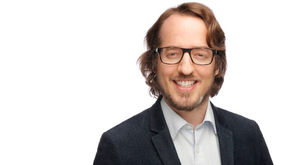Welsh Sustainability Leader Martin Koehring on building a just and regenerative future
With strong ties to Wales, Martin Koehring brings a grounded perspective shaped by his regional roots and international expertise. His connection to the country continues to influence his commitment to sustainable development and economic transformation across the UK and beyond.
In this exclusive interview with The Champions Speakers Agency, Martin shares timely insights on how environmental, social and governance (ESG) frameworks are evolving—and why business leaders must go beyond compliance to drive true regeneration. As one of the leading Environment & Sustainability speakers, he draws on years of research and thought leadership to highlight the shift from incremental progress to systemic change.
Martin also unpacks why a just and regenerative future starts with a change in mindset. From corporate boardrooms to coastal communities, he explores how reframing purpose, redefining value, and embedding equity can unlock new solutions for complex global challenges.
Martin Koehring: “It's important that ESG has recently changed in terms of the trajectory. I mean, one is that there had been a portion in the past to focus on requiring companies to disclose the kind of outside-in impacts of society and the environment on their financial performance — so looking at the impact that society, the environment and so on has on them.
“So that's the kind of single materiality. But there's an increasing focus now on what we know as double materiality — now looking also at the contribution that business makes and the kind of impact that businesses have on their environment and on society.
“So, it's increasingly that kind of perspective which is not just that outside-in but also the inside-out perspective. And increasingly looking at that kind of forward-facing data on progress, which is much more increasingly important.
“We can see that now with the EU’s Corporate Sustainability Reporting Directive, for example, or the UK's Transition Plan Taskforce Disclosure Framework, which launched in 2023. So they really require companies to disclose the most significant inside-out impacts as well on society and the environment. So that's a critical shift that is happening, which is really important.
“But beyond that, it's really important to look at the purpose of business and the purpose of these disclosure frameworks. It's critical that ESG doesn't just become a tick-box compliance exercise. There's been a backlash against ESG — both in terms of the corporate world, for example in the US, but also a backlash from civil society groups and from those that are concerned that ESG hasn't really been helping to really create real-world positive impacts for people and planet.
“That is really around the quality of ESG disclosure. And it's not just the data that is being reported, but it's really about how do we — and who — holds business to account, and for what reason, for what purpose, and what information do we really need to get to increase the role that business has in terms of building a just and regenerative future?
“We're seeing changes in that, and we see encouraging signs that where companies go beyond ESG — where, for example, they look at regeneration, looking at their whole supply chains and value chains to help, for example, replenish groundwater — or they're looking at things like the living income and so on. So, they're looking at environmental and social elements of their supply chains and of their impact that looks more at justice and regeneration — that goes beyond just the tick-box ESG indicators.
“So, it's important that as the ESG landscape evolves, to really make the ESG frameworks really transformative — rather than this kind of incremental approach that we have seen. Because we know that ESG frameworks, and these disclosure frameworks in general, can really help to facilitate that shift to shared value creation, to stakeholder capitalism that goes beyond just the focus on shareholders. And by really changing who these frameworks are for and for what purpose.
“It's also about the need to converge and consolidate these frameworks, because there has been this huge proliferation of disclosure frameworks. It's really this fragmented landscape that we're seeing — duplication, there's this alphabet soup. It's critical that convergence and that consolidation happens in a way that is really about the purpose of business in society, rather than just this kind of tick-box exercise.”

Martin Koehring: “Albert Einstein said you cannot solve a problem with the same mind that created it. So, it's vital that we look at the mindset that we have, and the kind of approach that we have to solving problems. Particularly around the polycrisis — the combination of different crises that we have — climate change, which is accelerating, dying species, loss of nature, plastic waste, chemical waste mounting. Of course, we've also got social crises — growing inequalities, never-ending wars.
“These problems are coming together in the polycrisis. To really be able to address this complex world and the complexity of these interconnected crises, it's important to look at the mindset that we confront these crises with. Building a just and regenerative mindset is critical for that.
“Sometimes we rush to solutions and we don't go back and think about the approach that we have. Mindsets are critical because it's really about bringing all of our assumptions, concepts and values together that inform how we see the world.
“So if we can transform the way we look at the world — our own mindset and other people's mindsets — and change that from an extractive and exploitative mindset to one that is just and regenerative, we can really start finding solutions that go beyond firefighting problems and realise our potential as stewards of this planet.
“Forum for the Future has created the Business Transformation Compass, which builds on the great work of many practitioners and thought leaders in this space — particularly the Regenerative Institute. There are four mindsets, and I just wanted to briefly walk through them to highlight the potential we have to change our mindset and help address the polycrisis.
“The first one is the risk mitigation mindset. There's also the zero harm mindset, the do good mindset, and the just and regenerative mindset. Let's look at these in turn and see what kind of impact they have. Obviously there are different dimensions to these mindsets — there's the personal mindset that we have, how we address issues, how we see the world — but you can equally apply that to organisational perspectives, social, political, economic and natural as well.
“Although the Compass was actually done with business in mind, it can be applied in different contexts — very personal as well, applied by civil society organisations, or even society as a whole.
“In terms of the risk mitigation mindset, this is really about doing less harm for the most efficient outcomes. It's often about doing the minimum necessary — for example, because of legal compliance reasons or the need to reduce immediate risk.
“From an individual perspective, this could be about using less wool, putting your pension into sustainable funds, or buying less stuff. From a business perspective, this is around measuring sustainability — the ESG focus, looking at how can we measure those indicators, or reducing the gender pay gap. These are important measures, but on their own they just deal with the symptoms rather than the root causes of the polycrisis.
“The next mindset is zero harm, which is about eradicating harmful practices in order to remain resilient while remaining in the current system. At the individual level, this could be about repairing and reusing things. At the business level, it might involve offering career advancement opportunities equally to employees, committing to zero emissions, or stopping activities that contribute to deforestation. Politicians, too — outlawing pesticides, eradicating harmful practices. But this mindset alone is not enough to turn the tide.
“Next is the do good mindset, about creating a net positive effect to help restore the health of ecosystems and societies. Businesses may look at policies to create diverse leadership. Politicians with a do good mindset might broaden access to healthcare, education, and so on. These activities are crucial but often well-intentioned without truly empowering people — more about doing things to people rather than with people.
“That’s why the just and regenerative mindset is so important. It’s about embracing the power of nature to regenerate — and recognising that humans are a fundamental part of nature. It’s about respecting everyone’s universal rights and potential to thrive. It requires a deep, holistic understanding of the systems we’re part of and changing the goals of those systems to support regeneration and justice.
“Take the food system — people say it’s broken. But if the goal of the system is extraction, maybe it’s not broken at all. If we want the goal to be regeneration — restoring soil health, animal welfare, social justice — then we need a different mindset. A just and regenerative mindset can help us look at the systems around us and their goals. It’s also about seeing systems as living phenomena we’re part of — in our businesses, societies, organisations.
“With this mindset, you feel a sense of control, empowerment, and agency. Companies are embracing this mindset. For example, natural body and hair care brand Faith in Nature has given nature a seat on its board. That’s a huge advancement. Another example is the Net-Works programme developed by carpet manufacturer Interface — helping coastal communities collect and sell discarded fishing nets, which are turned into carpet tiles. A great example of supporting the local economy and the environment.
“Countries, too, are embracing this mindset — Panama has granted rights to nature, and Bhutan uses Gross National Happiness as its key metric, rather than GDP. These approaches enable systems to realise greater potential in self-sustaining, positively reinforcing ways.
“So it's critical to look at your mindset — your organisation’s mindset — in terms of building a just and regenerative future.”
This exclusive interview with Martin Koehring was conducted by Jack Hayes of The Motivational Speakers Agency.
For More Information: Champions ESG Speakers



